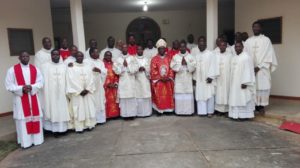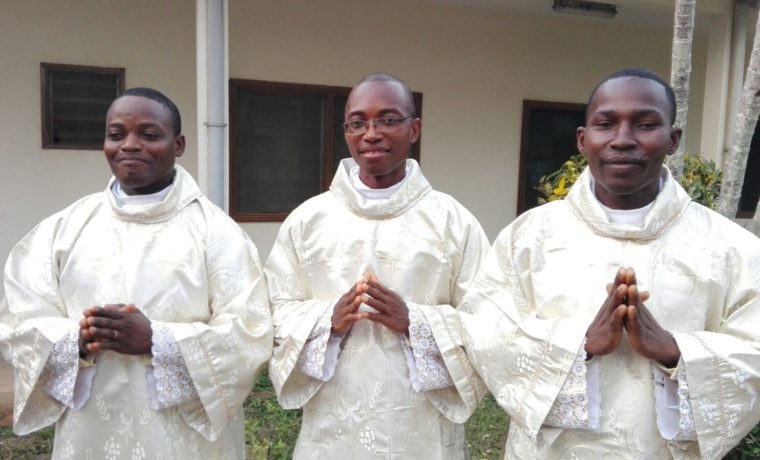 In the afternoon of 26 December 2017, St. Stephen’s Day, the day of that proto-martyr, three perpetually professed Camillians of the Vice-Province of Benin-Togo were ordained deacons at the Camillian seminary of Ouidah (Benin). Eight years ago, these three young men began their formation in our house of Ouidah. Under the vigilant guidance of their providers of formation and the benevolent gaze of the Vice-Provincial Superior and his council, these young men followed, step by step, the stages of the pre-postulancy, the postulancy and the novitiate, and at the present time they are attending the last year of the four-year course of theology at the Saint Gall-Ouidah Major Seminary.
In the afternoon of 26 December 2017, St. Stephen’s Day, the day of that proto-martyr, three perpetually professed Camillians of the Vice-Province of Benin-Togo were ordained deacons at the Camillian seminary of Ouidah (Benin). Eight years ago, these three young men began their formation in our house of Ouidah. Under the vigilant guidance of their providers of formation and the benevolent gaze of the Vice-Provincial Superior and his council, these young men followed, step by step, the stages of the pre-postulancy, the postulancy and the novitiate, and at the present time they are attending the last year of the four-year course of theology at the Saint Gall-Ouidah Major Seminary.
With strong and powerful voices, the three religious, Augustin GBEGNAHOUN, Narcisse AVAGBO and Christophe KOUTCHEGBE, answered ‘Yes’ to the question of the bishop who had asked them if they wanted to become deacons.
In his homily the celebrant His Excellency Msgr. Paul VIEIRA, the Bishop of the Diocese of Djougou, took this opportunity to give a great deal of useful advice to the new deacons.
Their parents, friends, acquaintances, men and women religious, priests and confreres of the Vice-Province of Benin-Togo came together to express gratitude to God as well as their friendship towards the new deacons. The animation of the liturgy was provided by the union of students who are receiving religious formation in Ouidah and by the community of Capuchin friars, Camillians, Capuchin sisters, and Daughters of St. Camillus.
May these new Camillian deacons become heroes of the World of God, reading it, reflecting on it, proclaiming it, and living it personally!
The House of Camillian Formation of Segbanou-Ouidah (BENIN)
The year 2017-2018: the beginning of formation for eleven young men
 After three months of continuous presence in the house of formation, the Camillian students of the first year welcomed their new accompanier, Fr. Epiphane Nayéton, who had returned from his studies in Rome. His presence completes the formation team which is made up of five members.
After three months of continuous presence in the house of formation, the Camillian students of the first year welcomed their new accompanier, Fr. Epiphane Nayéton, who had returned from his studies in Rome. His presence completes the formation team which is made up of five members.
After about ten years of formation in this house, the young men are initiated every day into the exercise of the Camillian ministry at the ‘St. Camillus Garden’ Nursing Home and the St. Camillus Clinic, both of which are adjacent to the house of formation. At the same time, they are attending the philosophy course held at the institute of the Capuchin friars and the theology course held at the Saint Gall Major Seminary, both of which are a short distance away. Once a week, accompanied by a provider of formation, these young men assure that there are visits to the patients of the city hospital of Ouidah. This is a fine experience which always ends with a Holy Mass together with the patients in the chapel of the hospital, which we Camillians built.
This year our Camillian house of formation of Ouidah has forty students (postulants and professed). The students are accepted after their school diploma or a university degree.
Life after Boko Haram: Didactic Suggestions in the Light of the Contemporary Context
By Epiphane Stéphane Nayéton, a priest of the Order of the Ministers of the Sick. After his studies in philosophy and theology at the Saint Gall-Ouidah Major Seminary (Benin), he engaged in his mission in Benin, in France and in Italy as a provider of formation, a chaplain and a rector. He has a specialist degree in clinical psychology and the technical and psychological sciences from  LUMSA University in Rome. He was awarded a degree in humanities and the social sciences by the National University of Benin. He teaches psychology and the religious sciences in various institutes and houses of formation.
LUMSA University in Rome. He was awarded a degree in humanities and the social sciences by the National University of Benin. He teaches psychology and the religious sciences in various institutes and houses of formation.
Every trauma has devastating consequences for a human being, above all if it takes place during childhood. This work bears witness to the psychological trauma that was experienced by a man who was kidnapped by the Jihadists of Boko Haram in the North of Nigeria. Poverty, unemployment, corruption, injustice, ignorance and illiteracy are identified as the principal motivations that lead young men to become Jihadists and cutthroats. From the careful analysis of real stories, gathered directly from the individuals concerned, a therapeutic suggestion emerges that is addressed to all those who have been marked by trauma following events of terrorism.















Camillians on Facebook
Camillians on Twitter
Camillians on Instagram